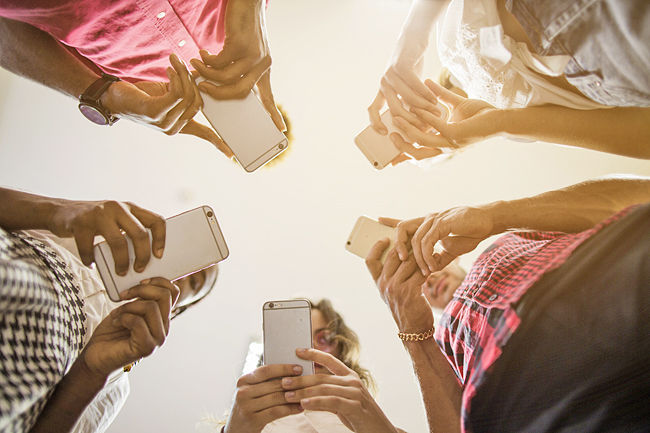THE WASHINGTON POST – Does social media make us more connected or more of a mess? Odds are, the answer is both.
How social media impacts our lives depends on how we use it, mental health experts say. Are you using the apps to tell your own story and learn about other people’s?
Or are you engaging in the same types of comparison and consumption that make people feel miserable, online and off?
Like it or not, social media is part of our lives, so it’s important to stay curious about how it makes us feel. Here are eight questions to see how often you set healthy boundaries or seek out some extra joy online.
If your social media habits are weighing you down, we’ve got tips to set your relationship on the right track.
DO YOU SPEND MORE TIME SCROLLING THAN SHARING YOUR OWN POSTS OR CHATTING WITH OTHERS?
Online friendships can protect against depression, studies have found.
At the same time, people who spend a lot of time scrolling or checking metrics such as likes may feel more depressed over time.
Social media companies claim to bring people together, but that can’t happen if we feel stuck comparing ourselves or seeking positive feedback instead of building connections, said chief science officer Mitch Prinstein at the American Psychological Association.

DO YOU CUSTOMISE YOUR ALGORITHMS BY FILTERING OR BOOSTING CERTAIN CONTENT?
Most algorithmic social feeds include tools to help you adjust what you see.
For instance, if toned abs and glute workouts have taken over your Instagram Explore page, you can filter out content with the word “fitness” anywhere in the caption or hashtags. TikTok recently introduced a tool that lets you reset the algorithm if yours has gone haywire.
DOES USING SOCIAL MEDIA MAKE YOU FEEL ANXIOUS OR LETHARGIC?
Your body provides valuable signals as to whether your social media habits are helping or hurting you, said doctor turned trauma therapist Christine Gibson who makes TikToks about mental health for an audience of almost 130,000.
If your body or brain feel numb or you feel pressure to keep scrolling for some type of “fix,” it’s time to step away, she told us.
DO YOU SEEK OUT SPACES OR COMMUNITIES ON SOCIAL MEDIA THAT ENCOURAGE YOU TO TAKE GOOD CARE OF YOURSELF AND OTHERS?
For many people, social media communities provide valuable and even lifesaving sources of support.
Others get sucked into toxic communities that encourage hateful or unhealthy behaviours.
Writer and cultural critic Rayne Fisher-Quann said she finds herself drawn to groups that promote hope and healing – for themselves and the world around them.
DOES SOCIAL MEDIA DISRUPT YOUR SLEEP?
About one-third of adults in the United States get insufficient sleep, which can contribute to a host of health problems.
And with some social media apps designed to keep us scrolling as long as possible, logging off at night can protect our physical and mental health.
Multiple studies of young people have found associations among social media use, poor sleep and mental health.
DO YOU OPEN SOCIAL MEDIA APPS WHEN YOU’RE NOT LOOKING FOR ANYTHING IN PARTICULAR?
Plenty of habits – from running to watching TV to tapping open your favourite social app – can cross the line into compulsions.
If your social media use is bothersome to your loved ones or yourself, try an intervention like taking a one-month break or switching off your WiFi each night on a timer.
You can also turn your phone to greyscale to make your screen less stimulating.
DO YOU BUY THINGS YOU DON’T NEED AFTER SEEING THEM ON SOCIAL MEDIA?
If #TikTokMadeMeBuyIt, it could become a problem. Gen Z users spend USD158 every year shopping on TikTok, according to a survey from CouponFollow.
Across social media apps, content creators promote makeup, household goods and other products with little transparency into what’s a paid ad. And with consumers holding record amounts of credit card debt, it’s important to weigh each purchase before clicking “buy.”
DO YOU FACT-CHECK CLAIMS YOU SEE ON SOCIAL MEDIA?
No matter how “online” you are, it’s easy to get duped by content that makes you emotional or confirms what you already believe. If you’re getting your news mainly from social media, make sure you’re finding the original source, gathering some context and learning the signs of a doctored or AI-generated image.
By setting thoughtful boundaries around your technology use, you can avoid late-night doom scrolling and compulsive app-checking. By staying sceptical of the ads and claims you see, you stick it to social media shysters – and the companies that benefit from selling your attention. Stay curious about how social media impacts your time, relationships and sense of self.
If you want to improve your relationship to social media, start by considering why you’re on social media in the first place. Is it to stay connected with friends? To keep tabs on trending TikToks? To fill the lonely three hours between dinner and bed? Once you’ve found that answer, observe how you use social media in a given day or week. You’re likely to find some old habits to kick and some new ones to focus on. Maybe start with tips to curb compulsive phone-grabbing and manage burnout from doomscrolling.
Social apps can be brilliant hubs for community, connection and cat videos, but they can also be sad wastelands where advertisers prey on our insecurities. If we don’t stop to consider what role we want social media to play in our lives, companies set the agenda. Take stock of how different apps and behaviours make you feel, and start dedicating more time to the good and less to the bad. – Tatum Hunter



















































